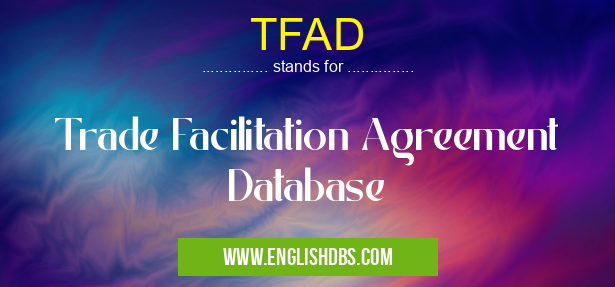What does TFAD mean in DATABASES
TFAD stands for Trade Facilitation Agreement Database. It is a comprehensive online database developed by the World Trade Organization (WTO) to provide information and analysis on trade facilitation measures implemented by its member countries.

TFAD meaning in Databases in Computing
TFAD mostly used in an acronym Databases in Category Computing that means Trade Facilitation Agreement Database
Shorthand: TFAD,
Full Form: Trade Facilitation Agreement Database
For more information of "Trade Facilitation Agreement Database", see the section below.
TFAD Meaning and Purpose
TFAD aims to enhance transparency and promote knowledge sharing in trade facilitation by:
- Collecting and disseminating data on trade facilitation measures, such as customs procedures, border controls, and logistics infrastructure.
- Identifying best practices and success stories in trade facilitation implementation.
- Supporting countries in their efforts to improve trade facilitation practices.
Key Features of TFAD
- Country Profiles: Provides detailed information on trade facilitation measures, commitments, and implementation progress in each WTO member country.
- Legal Texts: Includes the full text of the WTO Trade Facilitation Agreement (TFA) and its accompanying Annexes.
- Search Engine: Allows users to search and filter data based on specific criteria, such as country, measure type, or keyword.
- Analytical Tools: Features interactive visualizations, dashboards, and reports to analyze trade facilitation data and trends.
- Technical Assistance: Offers resources and guidance for countries seeking to implement or improve their trade facilitation measures.
Benefits of Using TFAD
- Businesses: Gain insights into trade facilitation practices in different countries to optimize their supply chains and reduce trade costs.
- Government Officials: Access data and best practices to inform policy decisions and improve trade facilitation in their own countries.
- Researchers and Analysts: Utilize TFAD as a valuable source of information for research and analysis on trade facilitation.
Essential Questions and Answers on Trade Facilitation Agreement Database in "COMPUTING»DB"
What is the Trade Facilitation Agreement Database (TFAD)?
The TFAD is a publicly accessible online database that provides information on trade facilitation measures implemented by World Trade Organization (WTO) members. It aims to enhance transparency, promote best practices, and support capacity building in trade facilitation.
What types of information does the TFAD contain?
The TFAD includes information on trade facilitation measures related to customs procedures, border management, transport and logistics, trade finance, and technical assistance. It covers measures implemented by WTO members, as well as those supported by international organizations and the private sector.
Who can use the TFAD?
The TFAD is designed for use by a wide range of stakeholders, including government officials, trade policymakers, businesses, researchers, and development partners. It is a valuable resource for those seeking to understand and improve trade facilitation practices.
How is the TFAD maintained and updated?
The TFAD is maintained by the WTO Secretariat in collaboration with WTO members and other stakeholders. Information is collected through surveys, notifications, and contributions from experts. The database is regularly updated to reflect the latest developments in trade facilitation.
How can I access the TFAD?
The TFAD is publicly accessible through the WTO website (https://www.wto.org/english/tratop_e/tradfa_e/tfa_database_e.htm). Users can search the database by country, topic, or keyword.
What are the benefits of using the TFAD?
The TFAD provides several benefits, including:
- Enhanced transparency and access to information on trade facilitation measures
- Support for evidence-based policymaking and decision-making
- Identification of best practices and areas for improvement
- Facilitation of technical assistance and capacity building efforts
Final Words: TFAD is a valuable resource for all stakeholders involved in trade facilitation. It provides a comprehensive and up-to-date platform for sharing knowledge, identifying best practices, and supporting countries in their efforts to enhance trade efficiency and economic growth.
